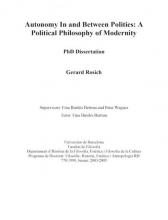Contacte
- Claustre de Doctors
- Universitat de Barcelona
-
Finca Agustí Pedro i Pons
- Av. Vallvidrera, 25
- 618 141 405
- cdub@ub.edu
Autonomy in and between polities: A political philosophy of modernity
This PhD has pursued three different and interconnected objectives, each corresponding to one of the three parts of the PhD. In Part I, a historical reconstruction is provided in order to present the background against which some political paradoxes in the present have to be understood in relation to globalization. On the one hand, it presents a range of historical developments that have helped to describe some lineaments of the modern world as a history of domination that underpins the univocal and reductionist conceptual association between modernity and globalization. A connection is established between this view of modernity and imperialism, and between progress and globalization. On the other hand, it discusses the conceptual shortcomings and historical inadequacy of this understanding of modernity against the background of recent findings and offers an interpretation of modernity as being constituted by a tension between a totalizing and a pluralizing interpretation of the world. An alternative pluralizing interpretation of modernity, which is not related to globalization, linked to the concept of autonomy and is best suited to understanding our current condition, is proposed. Part II aims, first, at challenging the narrative of the current hegemony of the liberal understanding of autonomy which underpins political globalization and makes unworkable any notion of a collective self; and second, at retrieving philosophically the normative content with which the concept of autonomy is associated. An assessment of the current global situation is offered which aims at showing the need for the construction of a bounded collective self in order to uphold democracy and challenge the modes of domination that contract theory, as a normative framework for institutional social life, perpetuates by means of legitimation or obfuscation. Part III establishes the historical context in which the views offered in parts I and II have been elaborated. First, a conceptual history of autonomy is provided. To my knowledge, no exhaustive and systematic history of the concept has been researched in scholarship. It has been taken for granted that Immanuel Kant is the inventor of the concept in its modern use, a view reinforced through the impressive work of Jerome B. Schneewind. Allegedly, Kant’s work opens the path to the constitution of individual autonomy as the basic understanding of freedom. In contrast to this understanding, the aim of Part III is to show that in conceptual and in historical terms, autonomy (re)emerges in modernity after its invention in classical Greece as a political concept and as a defining quality of the collective self in its relation with the political Other. At the same time, this part aims at retrieving and grounding historically an alternative interpretation of modernity that challenges the hegemonic and univocal understanding of modernity that has been analysed in Part I. It analyses the different movements of reformation that took place during the first half of the 16th century in the Holy Roman Empire, which culminated in the 1555 Peace of Augsburg, as the experiences under which the concept of autonomy was reintroduced into European modernity. It shows that at the moment when European imperialism was beginning with the “discovery of America”, alternative interpretations and experiences were already at hand, which aimed at challenging precisely this notion of imperialism. Part III thereby grounds in historico-conceptual terms the interpretation of modernity offered in Part I and the assessment of autonomy offered in Part II.


